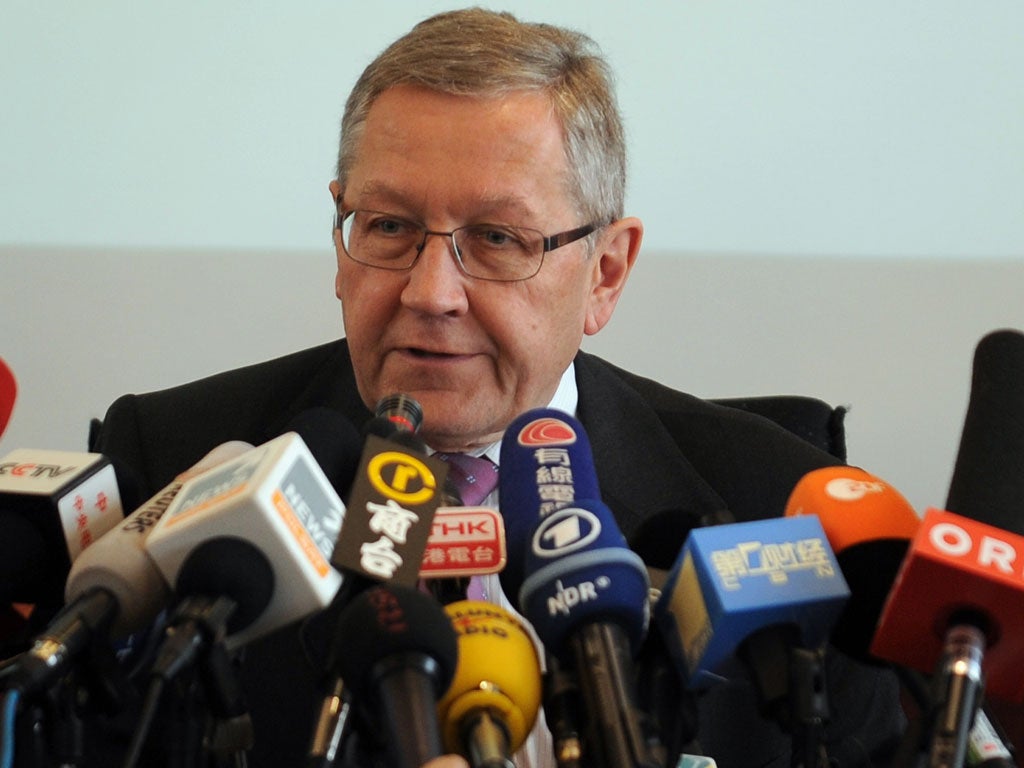China holds Europe to ransom over £62bn bailout deal
Beijing plays down expectations of immediate cash injection

Your support helps us to tell the story
From reproductive rights to climate change to Big Tech, The Independent is on the ground when the story is developing. Whether it's investigating the financials of Elon Musk's pro-Trump PAC or producing our latest documentary, 'The A Word', which shines a light on the American women fighting for reproductive rights, we know how important it is to parse out the facts from the messaging.
At such a critical moment in US history, we need reporters on the ground. Your donation allows us to keep sending journalists to speak to both sides of the story.
The Independent is trusted by Americans across the entire political spectrum. And unlike many other quality news outlets, we choose not to lock Americans out of our reporting and analysis with paywalls. We believe quality journalism should be available to everyone, paid for by those who can afford it.
Your support makes all the difference.Eurozone leaders were left sweating last night after China played down expectations that it would quickly make a much-needed cash injection to the EU bailout fund.
The chief executive of the European Financial Stability Facility (EFSF), Klaus Regling, was in Beijing yesterday with the hope of coaxing a speedy investment from the world's second-largest economy. But, despite hopes that the opportunity to take a leading role in managing global finances would prove a powerful incentive for Beijing, European observers were prepared for the Chinese to exact a heavy price in return for providing up to €70bn (£62bn) to the fund.
After meetings with senior officials, Mr Regling told reporters that a quick deal was unlikely. Meanwhile, the Chinese Deputy Finance Minister Zhu Guangyao said China would need more details of the planned boost to the EFSF before it would commit to any deal. "We must wait for the technical structure to be very clear and have serious and specialised discussions before making a decision on investment," Mr Zhu told a news conference in Beijing.
Mr Regling was nonetheless bullish about the prospects of China ultimately putting in the cash that the eurozone countries so urgently want for the fund, which was set up in May 2010 and is set to be boosted to £880bn under the plan.
China is a likely candidate to provide a share of that money. Europe is a key export market, and Beijing has cash to spend. With a war chest of £2 trillion, it has the biggest foreign exchange reserves in the world and is keen for vehicles to invest its funds in.
"We all know China has a particular need to invest surpluses," said Mr Regling. He said a quick deal was unlikely but he was "optimistic we will have a longer-term relationship".
He said that China had not made any conditions about how it would buy EFSF bonds and that China had been a "good and loyal" buyer so far.
In a sign of the importance of Chinese participation, the French President, Nicolas Sarkozy, spoke to President Hu Jintao by telephone this week. "China hopes all these measures will help stabilise the European financial market and conquer the current difficulties and promote economic recovery and development," Mr Hu said, quoted on China's state television.
Mr Sarkozy said the Chinese leader had expressed his relief that Europe had announced a deal to tackle a debt crisis that otherwise could have taken down the entire world economy.
"China has a major role to play. China must deploy more resources to stimulate the world economy. If they decide to invest in the euro rather than the dollar, why reject that? Why not accept that the Chinese place their trust in the eurozone?" he said.
But Mr Hu made no explicit commitment of Chinese help. And speculation was rife yesterday that it would not provide Europe with the necessary funds without strong incentives.
Some analysts suggested that China could channel money through the International Monetary Fund because it would want to see stringent conditions over the extent of eurozone fiscal deficits applied to its investment. They also pointed to Beijing's irritation at previous European criticism of its human rights record and suggested that a less interventionist approach from the EU could be a quid pro quo of any deal.
A Chinese official implied earlier this week that the Chinese investment would not come easily.
"The chief concern of the Chinese government is how to explain this decision to our own people," Li Daokui, a monetary policy adviser to China's central bank, told the Financial Times. "The last thing China wants is to throw away the country's wealth."
While China's current holdings of euro bonds are not known, they are said to be focused on Germany and France, and much smaller than its holdings of US Treasury bonds. Some analysts reckon probably around one-quarter of its holdings are in euro assets.
Join our commenting forum
Join thought-provoking conversations, follow other Independent readers and see their replies
Comments